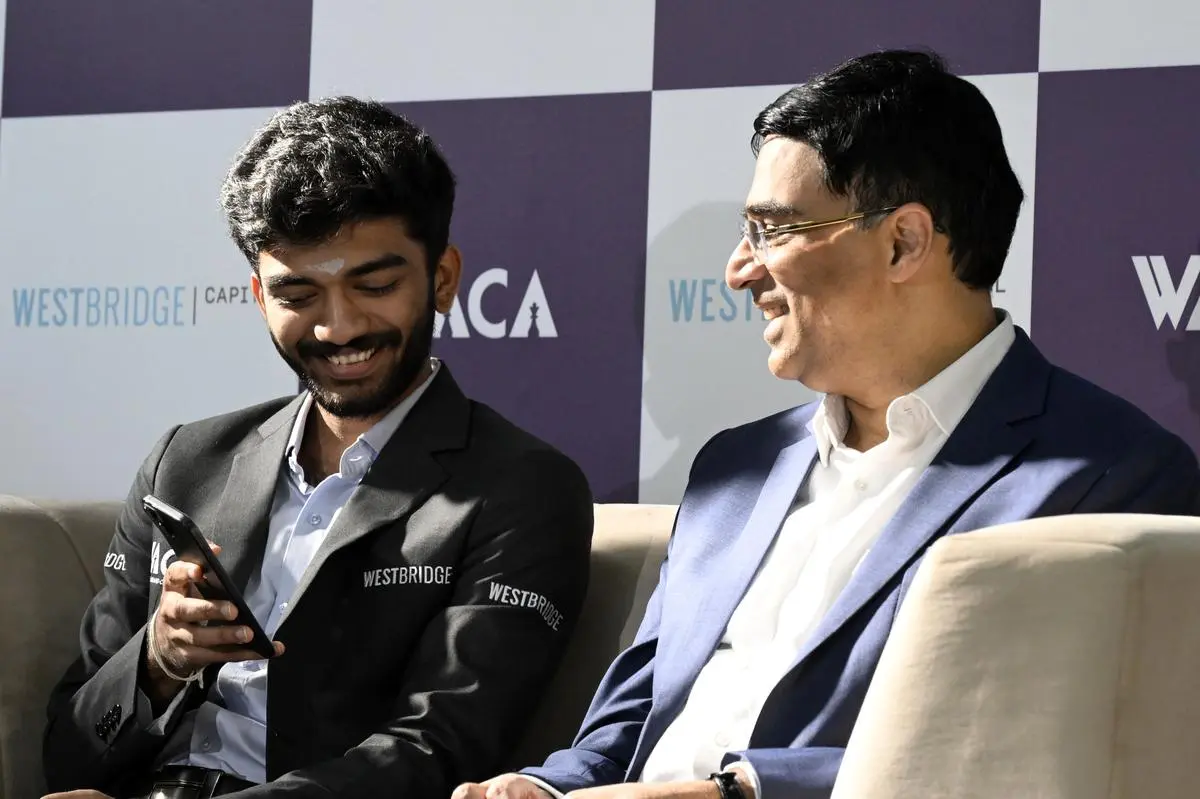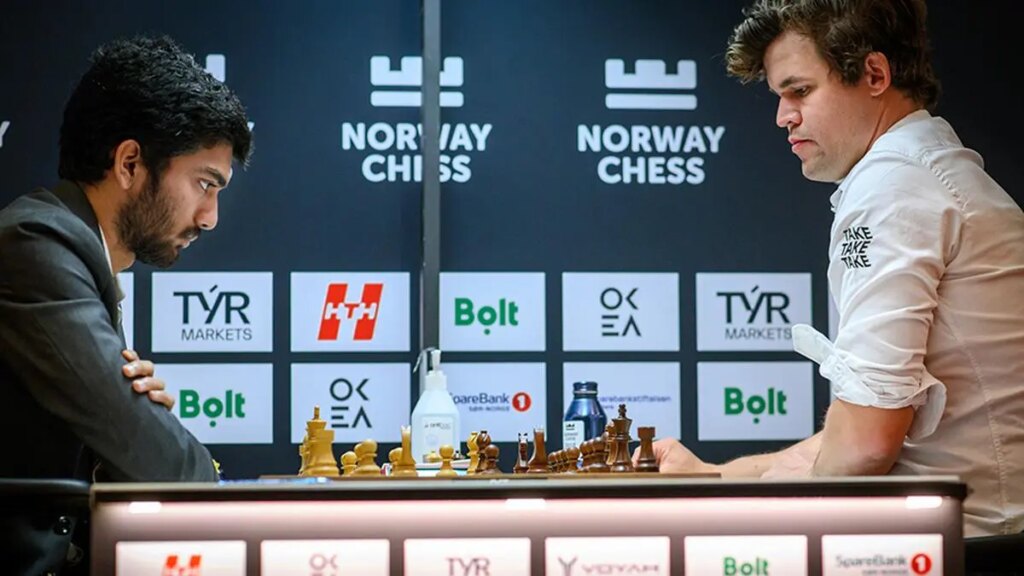On December 12, 2024, 18-year-old Gukesh Dommaraju created history by becoming the youngest-ever world chess champion. The teenage chess wizard from Chennai had beaten a star-studded line-up in the Candidates Tournament, including Super GMs (Grandmaster) like Fabiano Caruana, Hikaru Nakamura, Ian Nepomniachtchi, Alireza Firouzja, and others, before finally defeating the reigning world champion Ding Liren from China. But the crown did not rest easy on the young king’s head. Even though he was the world champion, the long shadow of Magnus Carlsen hung over his achievement. Carlsen, universally acknowledged as one of the greatest players of all time (if not the greatest), had voluntarily given up his title in 2023, undefeated; and Gukesh had never beaten him in the classical format of the game.
The new champion himself was painfully aware of the fact that though he may be the world champion he was not the best player in the world: “Becoming the world champion does not mean I am the best player; obviously that is Magnus… That will help me keep doing the right things, working hard, and trying to reach the level of greatness that Magnus has achieved,” he had said soon after his coronation.
Nearly six months later, on June 1, Gukesh could finally shrug off the burden of expectation on his young shoulders when he defeated Carlsen for the first time ever in the classical format in the prestigious Norway Chess tournament. It was his most significant win since becoming champion as it served to silence his detractors, destroy whatever seeds of doubt that may have crept into his mind, and boost his confidence by breaking what appeared to be a jinx. Norway Chess was the first time the two met across the board since Gukesh became champion, and it was one of the most highly-anticipated occasions not just in chess but in the whole sports fraternity.
“You come at the king, you better not miss”
For Carlsen, it was time for a reality check. It was not just a tear in his cloak of invincibility, but also something that wiped the smirk of smug superiority that came with the record of never being beaten by the world champion in the classical format. In their first match of the Norway Chess on May 27, the world number one ground down the world champion in a long-drawn 55-move battle that appeared to be heading for a draw. A single blunder by Gukesh in his strategy of attacking Carlsen’s king turned the tables in the latter’s favour. After the match, Carlsen posted on social media a quote from the popular television series “The Wire”: “YOU COME AT THE KING, YOU BEST NOT MISS.” The dual meaning in the polysemous phrase was not lost on anyone. On the one hand it could be interpreted as a comment on Gukesh’s play at Magnus’s king on the board; but on the other hand, it could also be perceived as a statement asserting who the real king of chess was.
Also Read | Gukesh Dommaraju: The boy king of chess
Gukesh gave his answer in their second match on June 1 in a most dramatic fashion. In all appearances, the world champion seemed to be heading for another certain defeat. Carlsen was outplaying him from early on, and Gukesh seemed to be struggling just to survive and remain in the game. With the time pressure on, Magnus blundered with the knight in the 52nd move, and Gukesh swooped upon the advantage and held on. Interestingly, the outcomes of both their first and second matches were hinged on a single mistake during the time scramble. The most common time control in classical chess involves an increment of 30 seconds from the 41st move onward; however, the Norway Chess tournament rules allow for only 10 seconds increment, which often results in a chaotic scramble in the end game.

World Chess Champion Gukesh Dommaraju and Indian chess Grandmaster Viswanathan Anand celebrate Gukesh’s remarkable victory at the World Chess Championship in Bengaluru, on January 5, 2025.
| Photo Credit:
Sudhakara Jain/The Hindu
Carlsen made his disappointment very evident. He banged his fist hard on the table, causing several of the pieces to fall and startling Gukesh. He immediately apologised, shook hands with his opponent, and left the room, giving the victor a pat on the back on his way out. Gukesh himself was stunned by the victory. He stood for a while as though in shock; when the moment sank in, he returned to the table and, as is his custom in victory or defeat, set up the pieces on the chess board.
Magnus’s thump on the table upon defeat reverberated across the world. Gukesh never needed to prove whether he was a worthy champion or not. But this victory over Magnus has been a momentous event in the young champion’s career as it silenced the doubting Thomases who had been raising the question of whether Gukesh was “deserving” of the world chess crown.
Victory against the odds
The second game with Carlsen was a close call for Gukesh. His dogged defending ultimately saw him through, but it was not the kind of victory he wanted. “I’m still kind of shaking after that game… There wasn’t much I could do. It was just clearly lost [his position]. I was just trying to make moves that were tricky for him, and luckily, he got into a time scramble… 99 times out of 100 I would lose… just a lucky day… [It was my] first classical win against Carlsen. Not the way I wanted it to be, but I’ll take it,” he said. Carlsen, too, felt it was a game he should have won, but for the fight put up by Gukesh. “On a normal day, of course, I win that game, but what he [Gukesh] does well is that he really fights, and he was there to take his chance, and he deserves credit for that,” he said.
Also Read | The champion on his conquests
Over the past few years, Carlsen has made it clear that he has lost interest in the classical format of chess, and that is one of the reasons why he abdicated his title in 2023. In fact, the man who has been the world number one since 2013, who has achieved the highest ELO rating in the history of the game (2880), and has the longest unbeaten streak in classical chess at the topmost level (125 games), hardly plays the classical format these days. However, his absence from the format has not affected his winning rate against other top players on those occasions when he does play, which makes Gukesh’s victory all the more creditable.
Speaking on Gukesh’s win over Carlsen, veteran Grandmaster Dibyendu Barua told Frontline, “This was a victory that Gukesh needed very much. This will not just boost his confidence for the rest of the tournament, but also for his games in the coming days. Defeating the world’s best is an important accomplishment; and Carlsen is in a much higher and stronger position than the rest of the players—something Gukesh himself had acknowledged after he became world champion.” Barua also feels that the win was a reaffirmation of Gukesh’s status as world champion. “Many people did not give him his due credit, claiming that without Carlsen, the world championship had no real prestige. Gukesh most definitely had the desire to prove himself by defeating Carlsen in the classical format. Moreover, winning from a lost position will make him more confident in their next encounters. Now his next challenge is to become the world number one. If he continues to play with this kind of consistency, he will reach that position in a few years,” said Barua, who is India’s second Grandmaster after former world champion Viswanathan Anand.
Interestingly, another legend of the game faced a similar problem after becoming world champion. In 1975, Anatoly Karpov became the undisputed world champion by default, when the mercurial Bobby Fischer refused to defend his title which he had won from Boris Spassky in 1972. Though one of the strongest players at that time, Karpov nevertheless had to prove that he was a deserving champion, and in the process became the most dominant player in the world for the next 10 years. Gukesh, too, has proved himself to be a worthy champion, defeating some of the biggest names in chess in the past five months. But winning against Carlsen may well set him on the path to the next level of his chess career. In fact, after defeating the world number one in the sixth round, Gukesh beat India’s number one, Arjun Erigaisi, in the seventh round. This, too, was Gukesh’s first win against Erigaisi in the classical format.
Source:https://frontline.thehindu.com/other/sport/gukesh-beats-carlsen-world-chess-champion-norway-2025/article69652089.ece

